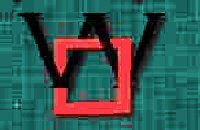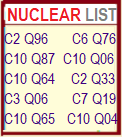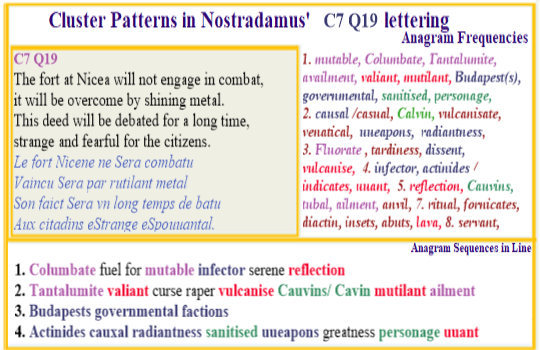 Analyses of all verses
Analyses of all verses
|
 Web Site
Web Site |
 All
Sefirots All
Sefirots |
Nostradamus C7 Q19: Budapest's governmental factions and nuclear weapons
Copyright: Allan Webber, December 2015, Apr 2023
 A large number of the English anagrams in Nostradamus'
Prophecies are so complex and rare that it seems unlikely they are there by
chance alone. The contents of this verse are of an even higher order placing it
amongst an elite group where the likelihood of chance as the generator is so
low that it appears impossible for the patterns in it to be there by accident.
A large number of the English anagrams in Nostradamus'
Prophecies are so complex and rare that it seems unlikely they are there by
chance alone. The contents of this verse are of an even higher order placing it
amongst an elite group where the likelihood of chance as the generator is so
low that it appears impossible for the patterns in it to be there by accident.
It is clear from the text that the encounter described in this verse is won and lost not through battles between men but purely by the use of a weapon. This is one of the great changes in the nature of war that has taken place since Nostradamus' time since people can be killed and places destroyed from an incredibly vast distance without the need of actual engagement with the enemy. In this case Nostradamus' words imply a form of chemical warfare and the nature of the chemical can be found in the hidden text but it also carries the institutional basis (militarism) that defines the specificity of the event.
 The lettering of the third line produces three
extraordinarily strong anagrams giving location, institution and agency.
The lettering of the third line produces three
extraordinarily strong anagrams giving location, institution and agency.
These three words use up all the letters in the line and they don't overlap.
They are adjacent so what we get when reading from right to left is Budapest's governmental factions (Son faict ſera vn long temps de batu ).
In C7 Q19 the bonds between text and
anagrams, anagrams and others in the cluster etc justify my comment that
nuclear events are a significant part of Nostradamus' prophecies.
The third line of text in C7 Q19 is a good starting point for showing the power of anagrams to this verse. The text tells us this verse's story relates to a deed that will be debated for a long time. That wording sets a tone that the anagrams fill out in an amazing way. There can be no doubt that debate over weaponry is a proper activity for such people. There can also be no doubt that the lettering which generates them is not reliant on trivial theft from the groupings of letters in the text.
But what caused people to conclude from the
text alone that this verse is about future weaponry? It was probably the
mention of a fort that is overwhelmed by a shining metal that is strange
and fearful to the people living in that place.
There is no direct reference to a weapon in the text yet there are adjacent anagrams for strange weapons (ſtrange_eſpouuan) where the letter w is formed from the letters uu. This is one of the few amendments I make to Nostradamus' lettering and I do it consistently since that letter was not a functional part of the sixteenth century French alphabet. This anagram appears in the fourth line (See chart of verse given above right).
In that same line preceding and adjacent to
the lettering for strange weapons there is an anagram for
actinides
(citadins e) the name for the series of
metals holding the most prominent radioactive elements. All its members
are radioactive but Uranium, Plutonium and Thorium are the most well
known. They are all shiny metals capable of striking fear into any
populace. And these radioactive elements certainly qualify as strange
weapons.
In C7 Q19 it is apparent that internal ties
are so strong they radically diminish the possibility the anagrams are
there by chance alone.
There is a further aspect of conformity that plays a part in determining the credibility of anagrams. It relates to word groups using related terms which only appear together in that verse.
This conformity aspect is illustrated by
columbate (combatu Le)
and tantalumite
(utilant metal
) in verse C7 Q19 for they relate to a
mineral source of importance to the nuclear industry. The two names are
interlocked via their union in the one type of rock and yet they appear
in lines 1 & 2 of the same verse. Significantly there are no other
occurrences of either in any other verse. They too are shiny metals that
play an important technology role in modern nuclear activities.
Key Ideas:
governmental, valiant curse, Tantalumite, vulcanisate, Columbate, radiantness, availment, Budapests, mutilant, sanitised, inclavate, personage, vulcanise, vicarates, reflection, fornicates, indicates / actinides, valiant, factions, tardiness, uueapons, infector, flourate, actual, dissent, diactin, ailment, faction, greatness, inserts, servant, generates, tubal, ritual, abuts, want, lament, instead.